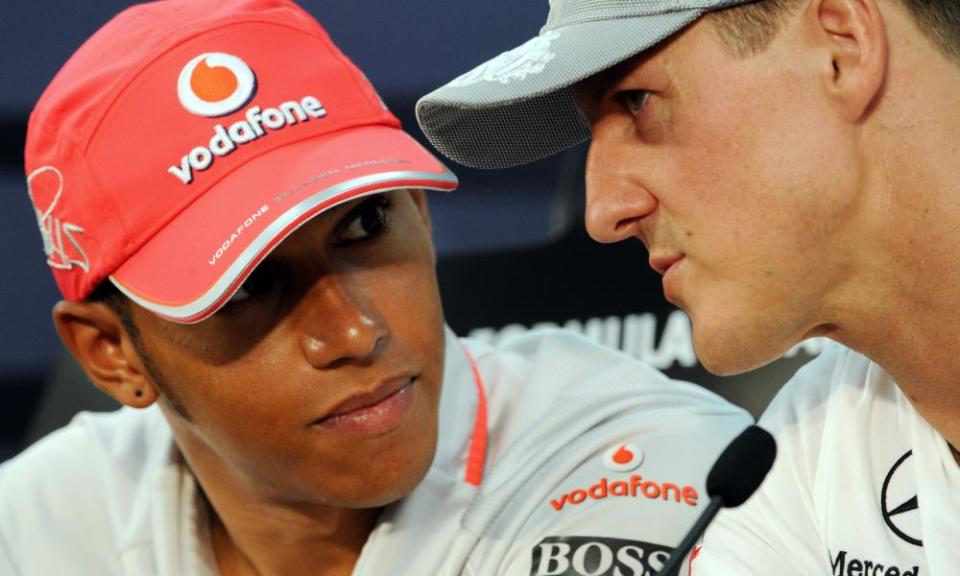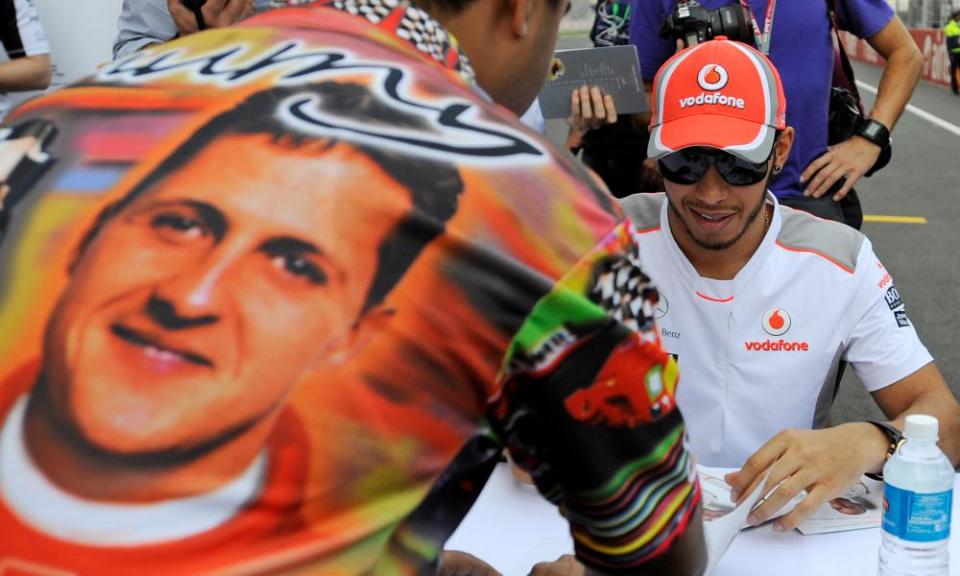What sets Lewis Hamilton apart from Schumacher is personal development

Perhaps one of the most admirable of Lewis Hamilton’s characteristics is a reluctance to aggrandise his success. Often his reaction when prompted is one of genuine, faint disbelief. This weekend at the Eifel Grand Prix a victory for the world champion would equal Michael Schumacher’s record of 91 Formula One wins. Should Hamilton do so it will be an achievement that, as much as he might not believe it, places him as one of the greats in the sporting pantheon and a pivotal force in the history of Formula One.
There is symbolism, too, about the venue of his second attempt to equal the mark; the Nürburgring is only 50 miles from Kerpen, where the German great was born, and is a track where Schumacher has more race wins – five – than any other driver.
When Schumacher dominated the sport, winning five consecutive titles for Ferrari between 2000 and 2004 and taking his total to seven, no one was expected to come close to matching, let alone, surpassing him. Hamilton, now 35 and in his 14th season, has almost done so. Schumacher’s greatest achievement, those seven titles, will surely be matched by Hamilton this year as well.
After his victory at the Tuscan Grand Prix the Englishman considered the prospect of equalling Schumacher’s number of race victories. “It just doesn’t seem real,” he said. As always he thanked his Mercedes team but concluded with a sense of wonderment at his own success. “I’m just a link in the chain. But I never thought that I would be here, that’s for sure.”
Related: 'One of my best drives' – Lewis Hamilton celebrates Spanish Grand Prix win
Hamilton and Schumacher belong to different eras, although they did race one another. Schumacher retired from the sport for the first time in 2006, and Hamilton made his debut in 2007. In 2008 Hamilton took his first title, while Schumacher made a comeback with Mercedes between 2010 and 2012. It was not a great success for him and when he bowed out again, Hamilton took his place at Mercedes in 2013 and began the march towards usurping the master.
He has taken five titles in six years since then. Those unfeasible tallies of Schumacher’s falling to a relentless pursuit during which Hamilton has only improved. His raw talent now honed by judgment, race craft, maturity and a work ethic the German might acknowledge.
Indeed, one driver recognised that he had the talent to do it back in 2008. “I would say, absolutely, yes [Hamilton could win seven titles],” Schumacher said. “Nobody thought, even me, that I could beat [Juan Manuel] Fangio. Then I did. Records are there to be beaten.”
Debates have raged over who is the better driver, Schumacher or Hamilton, since the pair began to share the rarefied air of the F1 record books. Yet genuinely comparing drivers of different eras is all but impossible. The regulations change, as does the machinery and the competition, the venues, every challenge evolving.
A definitive verdict would be subjective at best. Both are from humble backgrounds; Schumacher’s father was a bricklayer, while Hamilton’s held down three jobs in IT to support his son. Both entered the sport with a fearsome hunger to succeed and both made vital yet risky career moves. Schumacher went to Ferrari in 1996, with a brief to rebuild the team into a championship winning force again. It took four years but he did so. Hamilton left a successful and race-wining team in McLaren to join the still unproven Mercedes.
Schumacher has been lauded for building that Ferrari team around him, working with engineers and mechanics then going for a beer with them afterwards. Hamilton is not often given enough credit for doing similarly at Mercedes. He has grown into his role and Mercedes emphasise the time and effort he puts into developing the car and his team. Just what a strong relationship he now enjoys is clear by the visceral disappointment across the Mercedes garage when he or they do not deliver.

Yet the two also diverge in one key area. Schumacher, ruthless and determined, has drawn criticism for going too far. The Williams team still believe he intentionally took Damon Hill off the track to end his title challenge at Adelaide in 1994; he was punished for attempting to do the same to Jacques Villeneuve in the title decider at Jerez in 1997 and in 2006 he stopped on track at Monaco, preventing Fernando Alonso completing his qualifying run.
This is not to belittle Schumacher’s achievements but Hamilton’s career has been marked by his hard but scrupulously fair performances. He has made mistakes and held his hands up. He has been tested but not resorted to what Villeneuve pointedly referred to as “dirty tricks”.
What sets Hamilton apart now is his personal development. The greatest stimulus was perhaps striking out on his own, away from McLaren, the team that had nurtured him since he was 13, in 2012. It was the act of a young man who wanted to make his own mark, his own way. He has done so on track and this year proved unequivocally he can do so off track too.
As his confidence has grown and he has embraced life beyond F1, fashion, music, so too he has engaged with wider issues. He has become a committed environmentalist, a vegan, and this year his strident support of anti-racism and the Black Lives Matter movement has made him important globally, far beyond the fame he already enjoys as a driver.
Time magazine recently named him in its list of the 100 most influential people in the world, surely in acknowledgement of his insistence that racial injustice can no longer be ignored. He has received criticism for doing so, not least from those who believe politics do not belong in sport. The same critics who conveniently ignore the part the sporting boycott of South Africa played in ending apartheid. Hamilton has rightly recognised that every aspect of life is political and chosen to take part.
Nor should it be considered mere gesture politics. F1 has proved before that an individual can make a difference. Sir Jackie Stewart was criticised and indeed reviled by some for his drive to make the sport safer. Decades on, the impact of his pioneering efforts stand as testament to his convictions.
Hamilton is unafraid to act and while much of his confidence is fuelled by the success he has enjoyed, he is still a standard bearer for change. His status on track is no longer in doubt and when the numbers fall to him Hamilton will be the sport’s most successful driver and its most influential, setting him apart from Schumacher and all of the rest. Doubtless he might also find that hard to believe but it is a reality that will perhaps only sink in long after all the records have fallen.

 Yahoo Sport
Yahoo Sport 





































